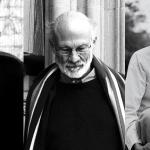 “Each of us aches for significance, meaning, uniqueness, preciousness, immortality, and great love and great beauty in our lives. This yearning is congenital and incurable. We are as Plato said, fired into life with this divine restlessness in us. But our madness comes… when the pressure for a cure for our mortality and insignificance gets too great and we fabricate the vital lie. We try, through our own efforts, to create significance, uniqueness, and immortality for ourselves.
“Each of us aches for significance, meaning, uniqueness, preciousness, immortality, and great love and great beauty in our lives. This yearning is congenital and incurable. We are as Plato said, fired into life with this divine restlessness in us. But our madness comes… when the pressure for a cure for our mortality and insignificance gets too great and we fabricate the vital lie. We try, through our own efforts, to create significance, uniqueness, and immortality for ourselves.
In the Protestant Tradition, contemplation is the antithesis of this…
Where talk and concern centers around money, food, entertainment, sports, sex, and health, there is little sense that the earth is ablaze with the fire of God, and even less of a sense that one should have his shoes off before it.”
– Ronald Rolheiser, The Shattered Lantern
What I take from this quote is that we all have an inner drive to feel significance and meaning in our lives. This is our default position–the human condition. From there we can take one of two pathways. We can become ambitious and strive to achieve significance and meaning, to create it for ourselves. Or we can embrace contemplation. Our lives are obviously a mix of both striving and contemplation, but what I take from Rolheiser today is this insight: at any given time we can only choose one of those two pathways.
In order to experience or practice contemplation we are required to leave the striving and achieving behind in order to receive significance and meaning from God. The two cannot exist in the same moment–striving and contemplation. Contemplation is the antithesis of our ambitious striving to be unique and to create significance and meaning for ourselves… a project which is doomed anyway.
Doing our work in order to create some sense of significance or meaning, versus doing our work in order to see God more clearly, see other people more clearly, and to participate in God’s mission of redemption… this is the choice we face in every moment. To choose contemplation is to find a new motivation behind our work and relationships, a new telos. Meaning and significance cannot truly be pursued, they must ensue. If we could ever really learn that reality our lives would immediately change. Meaning and significance do not come through striving, but through slowing and seeing. They are gifts– gifts that can be ours the moment we turn to contemplation instead of striving and ambition.
Contemplation leads to a very different kind of conscious experience of life. To love and serve the world not for my own sake, not in order to generate my own sense of significance and meaning, but just to delight in the goodness of being alive–that is the trick. That is true cruciformity. This is the new humanity Christ speaks of, the new creation and the abundant life.













